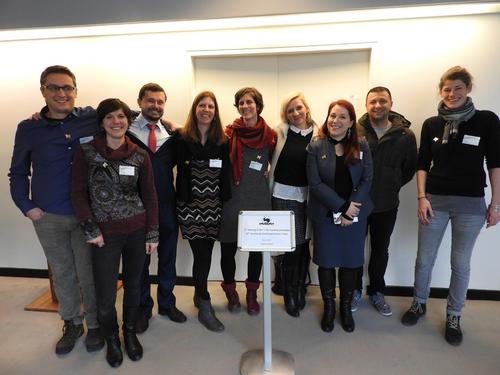
The Balkan Lynx team celebrates the vote.
© EuroNaturThe Balkan Lynx has to be strictly protected as a distinct subspecies of the Eurasian Lynx. This decision has been adopted unanimously at the meeting of the Berne Convention’s Standing Committee on December 5th. The vote will be officially presented to the public on Friday, Dec. 7th. The Berne Convention is one of the most important nature conservation agreements in Europe. The Balkan Lynx is now to be added to Appendix II as a subspecies of the Eurasian Lynx. The Convention provides for strict species conservation measures for the more than 700 species listed in this appendix. They must not be captured, killed, disturbed or traded. The relevant proposal had been filed with the Berne Convention’s Secretariat by lynx conservationists of our Albanian partner organisation PPNEA in cooperation with Albanian official representatives to the Berne Convention.
“This gives us another powerful argument against activities that would harm the Balkan Lynx”, says EuroNatur project leader Mareike Brix, welcoming the decision. This is exemplified by one of the two Balkan regions, where lynx offspring has been documented: the Munella Mountains in Albania. Together with Mavrovo National Park in Macedonia, this is a key region for Balkan Lynx conservation. However, the Munella Mountains are subject to massive land use pressure – amongst other things by mining which destroys the lynx’ habitats.
The Berne Convention’s decision also confirms the assessment by the International Union for Conservation of Nature (IUCN), which had recognised the Balkan Lynx as a distinct subspecies of the Eurasian Lynx and classified it as “critically endangered”. Recent population estimates reckon that there are no more than 50 Balkan Lynxes left.
However, this success for the Balkan Lynx is not home and dry yet. Now we have to overcome a period of three months, during which signatory states to the Berne Convention may object the decision – including Macedonia and Albania.


